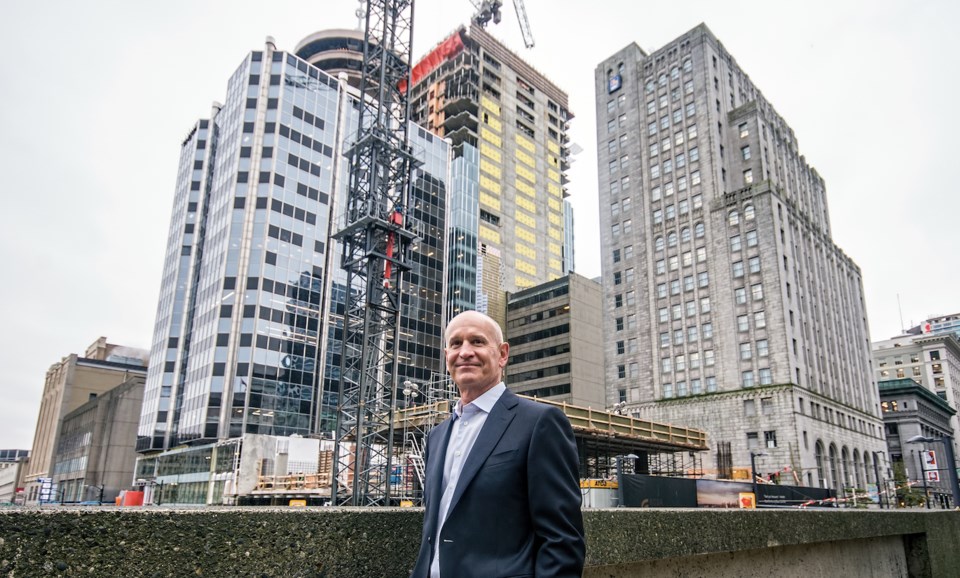Downtown Vancouver office leasing decisions slowed to a trickle during the depths of the COVID-19 pandemic.
That's starting to change. Brokers, such as Avison Young principal Glenn Gardner, say activity has picked up in recent weeks.
Still, Gardner is seeing many potential clients wait until the pandemic is closer to its end before committing to make moves. They would like to see more clarity on how many employees will return, and how much need they have for space, he said.
That heightens the significance of provincial health officer Bonnie Henry's March 29 urging for people to work at home whenever possible. Having fewer workers in downtown offices simply prolongs the uncertainty.
“If you have a lease expiring, you have to address it,” Gardner said. “But anybody who has not had to make a decision, because of the nature of the lease expiring, has chosen not to, at this point.”
Indeed, executives such as Venue West Conference Services owner Sue Daugulis have told BIV that they are waiting a little while longer before making any big real estate decisions.
Daugulis’ company’s lease on 2,700 square feet at 1040 Hamilton Street expired at the end of July, which may have been good timing because she saved money by vacating the office and having all employees work from home.
Little work was to be had in the convention management sector, but Daugulis did not terminate any staff.
She is now waiting for a newly hired COO to move to Vancouver, and for more clarity on when business will pick up before leasing new space.
She is looking, though, and plans to lease a similarly sized office somewhere close to the Vancouver Convention Centre.
Gardner said the workplace trend toward shared desks is likely to continue, and that is prompting some companies to consider reducing their office footprints.
Many professional-service companies, such as law firms and technology businesses, however, have been looking to expand square footage, he added.
Downtown Vancouver office vacancy rose to 6.6 per cent at the end of 2020, up four percentage points from 2.6 per cent one year earlier, according to Avison Young data.
“It’ll be interesting to see, after it’s all said and done, how the vacancy rate reacts,” Gardner said.
“We’re in a situation, in my opinion, where it’s actually more healthy, because an increase in vacancy allows organizations to have options with respect to their real estate. It also allows landlords the opportunity to get creative with their clients on how to accommodate their requirements.”
While Gardner estimated that downtown office buildings are 30 per cent occupied with workers, he said he expects most employees to go back to offices at least part time post-pandemic.
Colliers International senior managing director Maury Dubuque agreed.
“I’m getting increasingly tired of hearing about the death of the office building,” he said. “I’m a firm believer that people will return to the office, as long as we give them reason to do that.”
Teamwork, collaboration and opportunities to join conversations that lead to innovation are some of the reasons employers will likely want staff to be back at the office at least part time.
Dubuque, whose team is seeking larger offices for several law firms, said much of the space-shedding that prompted the rise in the vacancy rate came from smaller firms. Larger firms have been better able to weather the pandemic.
There is also increased vacancy in buildings that Dubuque described as A- or B-class structures. Buildings that fall under the C-class designation often have a historic or heritage nature, and have been upgraded to be attractive to some, he said.
“I’m not going to be surprised if I see some of those A- and B-class buildings repurposed to be rental buildings – multi-family rental buildings,” he said.
One challenge in converting office buildings to residences is that floor plates can be much larger, and it can get tricky designing floor plates so all homes can have windows.
Some B-class buildings, however, have smaller floor plates that give them potential for this repurposing, Dubuque said.
He sees the lower-grade office-building conversions as happening not only because they have higher vacancy, but also because employers want to be in better digs.
Colliers itself plans to move out of about 50,000 square feet at 200 Granville Street in mid-2023, and into 42,000 square feet at a new Bentall Kennedy tower at 1090 West Pender Street.
Leading up to that move, Colliers asked its employees what they valued most in an office.
Great air conditioning, heating and ventilation topped the list, as did innovations such as touchless surfaces and outdoor areas, even though the polling was done pre-pandemic.
Those desired amenities were a big part of Colliers deciding to move to an AAA-Class building, Dubuque said.



